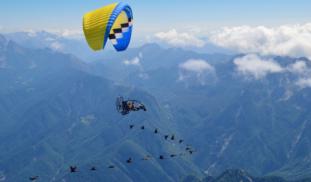Please wait...
About This Project
Migrating is strenuous for birds. Therefore, they need to find energy-saving strategies, such as flying in a V-formation. In a V-formation, birds take advantage of the up-wash produced by the preceding bird. Yet, the trailing bird does not get any benefit, hence birds switch their positions inside the flight formation. I hypothesize that every individual contributes to the flying effort and hence there is a pattern in the switches, which may be also affected by social relationships.

Browse Other Projects on Experiment
Related Projects
Out for blood: Hemoparasites in white-tailed deer from the Shenandoah Valley in Northern Virginia
Our research question centers about the prevalence and diversity of hemoparasites that infect ungulate poplulations...
Using eDNA to examine protected California species in streams at Hastings Reserve
Hastings Reserve is home to three streams that provide critical habitat for sensitive native species. Through...
How do polar bears stay healthy on the world's worst diet?
Polar bears survive almost entirely on seal fat. Yet unlike humans who eat high-fat diets, polar bears never...


